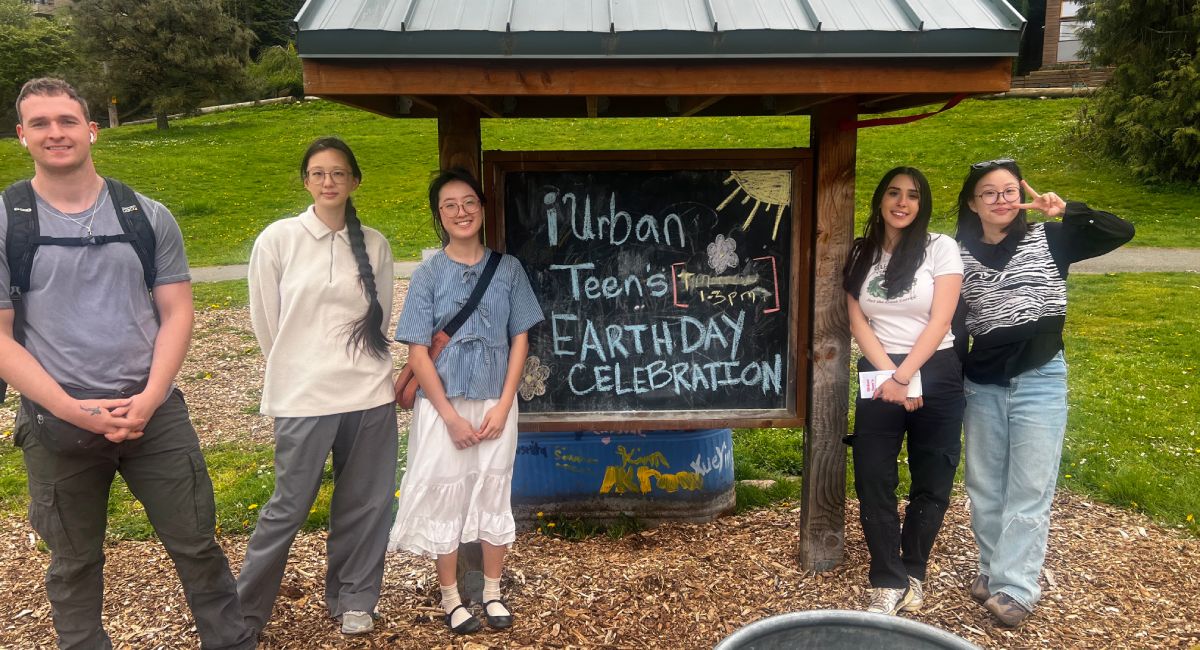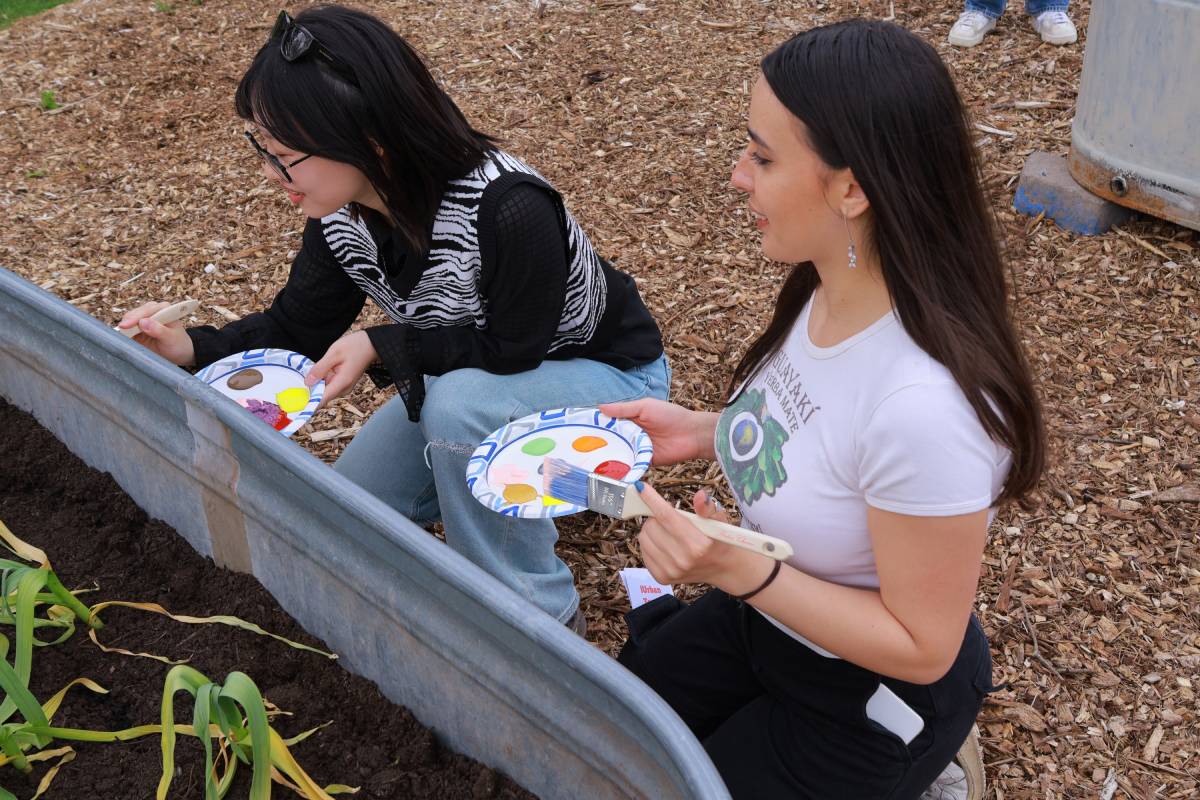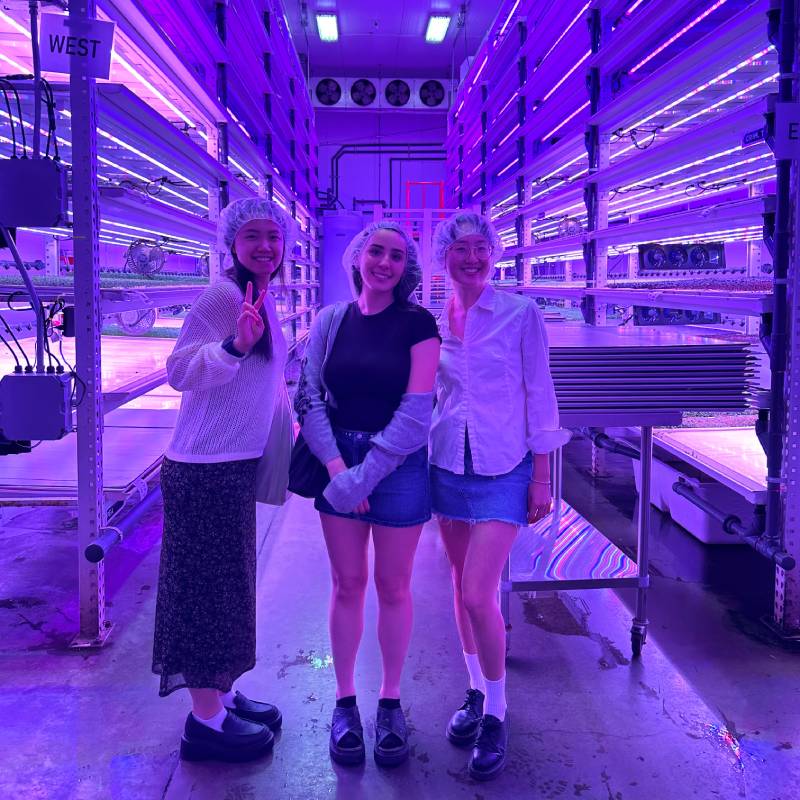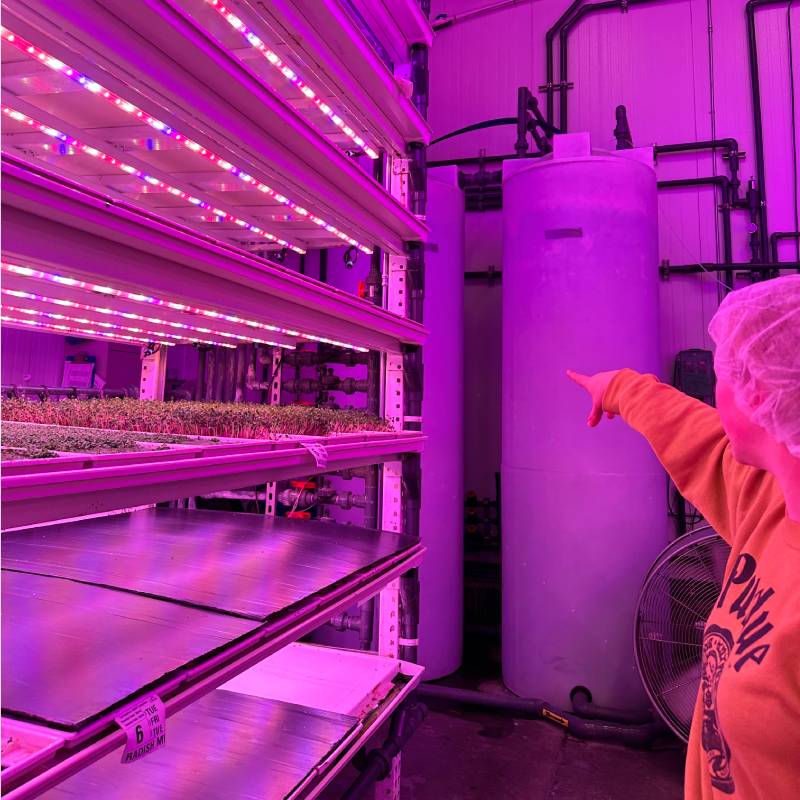
Undergraduate students in the UW food systems major visit the Rainier Community Center’s urban garden in southeast Seattle as part of their spring capstone project.
The Rainier Community Center’s urban garden sits on the site of an old capped-landfill in southeast Seattle, but that doesn’t mean vegetables can’t be grown there. Instead, growing requires some above-ground creativity.
A common solution to growing on contaminated soil is to use raised garden beds, which have already been put to use in the garden. But leaders at iUrban Teen, a nonprofit which manages the garden, also wanted to know if hydroponics could be another solution to growing food outside without digging into the ground. Hydroponics is a form of gardening that uses water, nutrients, and light rather than soil, and because it is traditionally done in controlled indoor environments, developing an outdoor system would be an innovative approach to soil-free gardening.
iUrban Teen partnered with the University of Washington School of Public Health Food Systems, Nutrition, and Health program to find an answer to this question. The answer will help with iUrban Teen’s goal of growing thousands of pounds of leafy greens and vegetables for their unhoused community neighbors and will provide a space for high school-aged youth underrepresented in STEM careers to study environmental and agricultural science.
Undergraduate students in the UW food systems major have had the opportunity to support this work through their capstone projects. Using their four years of training in food systems, they were tasked with developing blueprints for two types of outdoor hydroponics systems: solar-based and non-electric. They also collected nutrient data for plants that can be grown in these systems. In the future, these systems they are developing will be placed in greenhouses and used by local high school students to run the community garden.
“Our goal is to provide not only an educational opportunity for marginalized students, because this program targets BIPOC and underrepresented students in STEM fields, but also to hopefully provide education to the greater community of Columbia City and Seattle and donate produce to the Seattle Indian Center,” said Deborah Chu, a senior and co-student-lead of the capstone project.

Creating these solar and non-electric hydroponic systems for the garden requires city permission, so Melanie Ocasio, supervising partner and manager for iUrban Teen, will use the blueprint plans the students develop to seek approval from Seattle Parks and Recreation this year, with the hope of implementing them in the garden in early 2025. Seattle Park and Rec’s Seattle Urban Food Systems Program oversees the land.
“The more support that we have from the UW or other organizations along the way, the more likely it is to be approved,” Ocasio said. “I haven’t seen too many models for an outdoor greenhouse hydroponics system in Washington state or anything we’re making, so this is trial and error.”
Ocasio also hopes that the solar hydroponics gardening system the students are developing will serve as a model for other local community gardens to use solar energy to increase vegetable production and that the non-electric model can be used by families or individuals who hope to garden in their own yards.
To create the blueprints for the hydroponics system, the undergraduates divided into teams. One worked on plans for a solar-powered hydroponics system while the other group worked on a non-electric hydroponics system. To create their design, they had to consider many variables.
“As far as feasibility goes, there’s a lot of factors that go into building hydroponics, especially since we’re introducing solar,” said undergraduate student Callum Crist. “We have to figure out voltage from solar to battery and how that is going to pump the water. There are other factors like algae growth and sunlight. We are now voting on a greenhouse and have to consider dimensions with the plots of land.”
A team of students focused on nutrition were tasked with understanding the types of nutrients leafy greens and vegetables would need to thrive in the hydroponics environment. Students Jiayi Ge and Mia Li, who were on the nutrition team, said they cut two-liter clear soda bottles in half to create makeshift hydroponics systems to test out plants’ nutritional needs. They recorded pH levels and how much water the plants used as well as algae growth.
“Running the lab experiment in-person is really powerful because we are combining what we’ve learned for the four years from our major,” Li said.

The students also connected with other hydroponics growers in the state to learn from them about their techniques.
“It gets me excited to see how passionate other people are about hydroponics,” said Nina Goldman, undergraduate and student-co-lead of the project. “Having a teaching garden focused on the intersection between technology and farming for young people is really valuable.”
Ocasio said that an important part of developing urban community gardens is recognizing the historical trauma and racism that impact the relationship communities of color, especially Black communities, have with farming. Due to redlining and structural racism, many communities of color live in food deserts or in neighborhoods with industrial pollution which adds to the importance of creating urban gardens where communities can grow their own nutritious foods without chemicals.
“We’re now trying to bring in a holistic healing aspect to serving the community at large,” Ocasio said.
Students said that the partnership with iUrban Teen has been an important learning experience to put to use their four years of studying nutrition, problem solving, health equity and systems thinking. Goldman recalled how the students went from little knowledge of hydroponics design to developing blueprints for Ocasio.
“We went into this thinking we didn’t know anything about hydroponics, but then we realized we have been prepared for this because we knew the way to approach it,” Goldman said. “We know how to research and ask the right questions, like what happens when the greenhouse gets really hot and the temperature of the water increases? How are we going to make sure the temperature of the water stays stable? We’ve thought about pests and disease and things the average person wouldn’t think to consider, but we know how to think of every outcome and barrier we might come across.”
Chu added that the broad scope of their major allowed the students to tackle an unfamiliar topic in a way that a specialized field of study might not have allowed for.

“It is hard to visualize what a career in food systems might look like, but this is one of the first real-life examples where we are put into a situation and can see how the things we’ve learned over the past few years are being put to use,” Chu said. “It’s very hands-on and it’s been a really good learning experience for everyone.”
Yona Sipos, associate director of undergraduate experiential learning for the food systems major, said that while this is the first year the food systems capstone class has partnered with iUrbanTeen, she and Ocasio hope that it won't be the last.
"My goal is always to support new and returning community partners of the food systems capstone,” said Sipos, who is also an associate teaching professor in the Food Systems, Nutrition, and Health program and the Department of Environmental & Occupational Health Sciences. “For example, this year we were thrilled to engage with iUrbanTeen for the first time, and to partner with the Danny Woo Community Garden and the Black Farmers' Collective for the third and fourth time. This strategy allows the students to contribute to where there is energy and capacity."
Undergraduate food systems students Deborah Chu, Nina Goldman, Callum Crist, Jiayi Ge, Mia Li, Sylvia Liu, Anna Pham, Mark Han, John Wang all participated in the Rainier Community Garden capstone project. Previous undergraduate student capstones can be found here.
The Food Systems Capstone is taught by Yona Sipos. Mariah Rubin serves as the Graduate Student Appointment for the course supporting experimental learning.